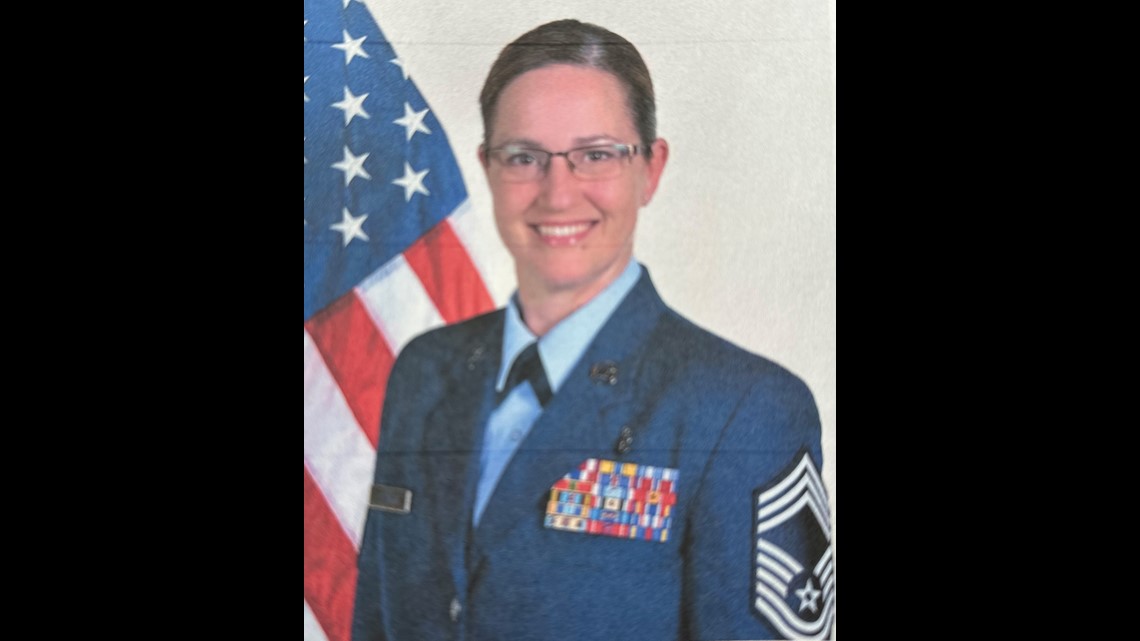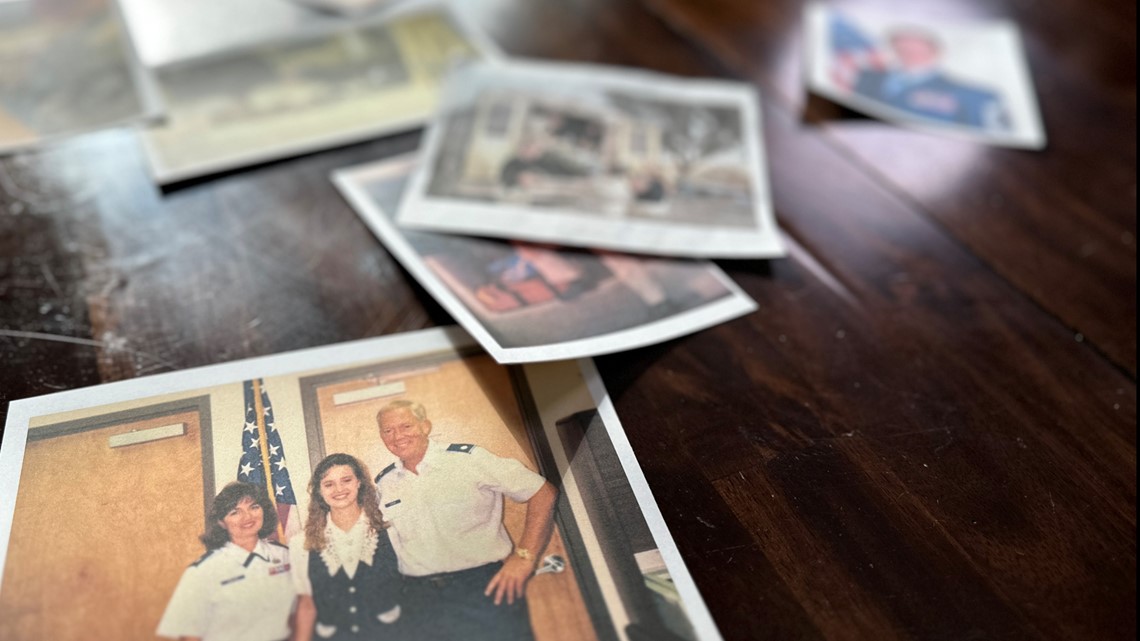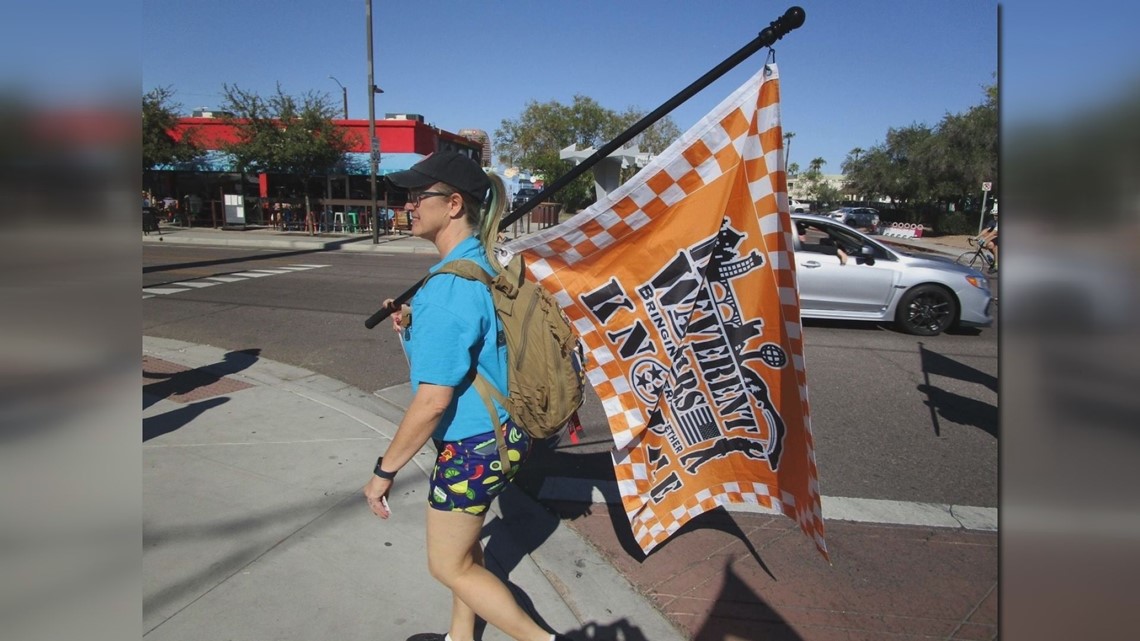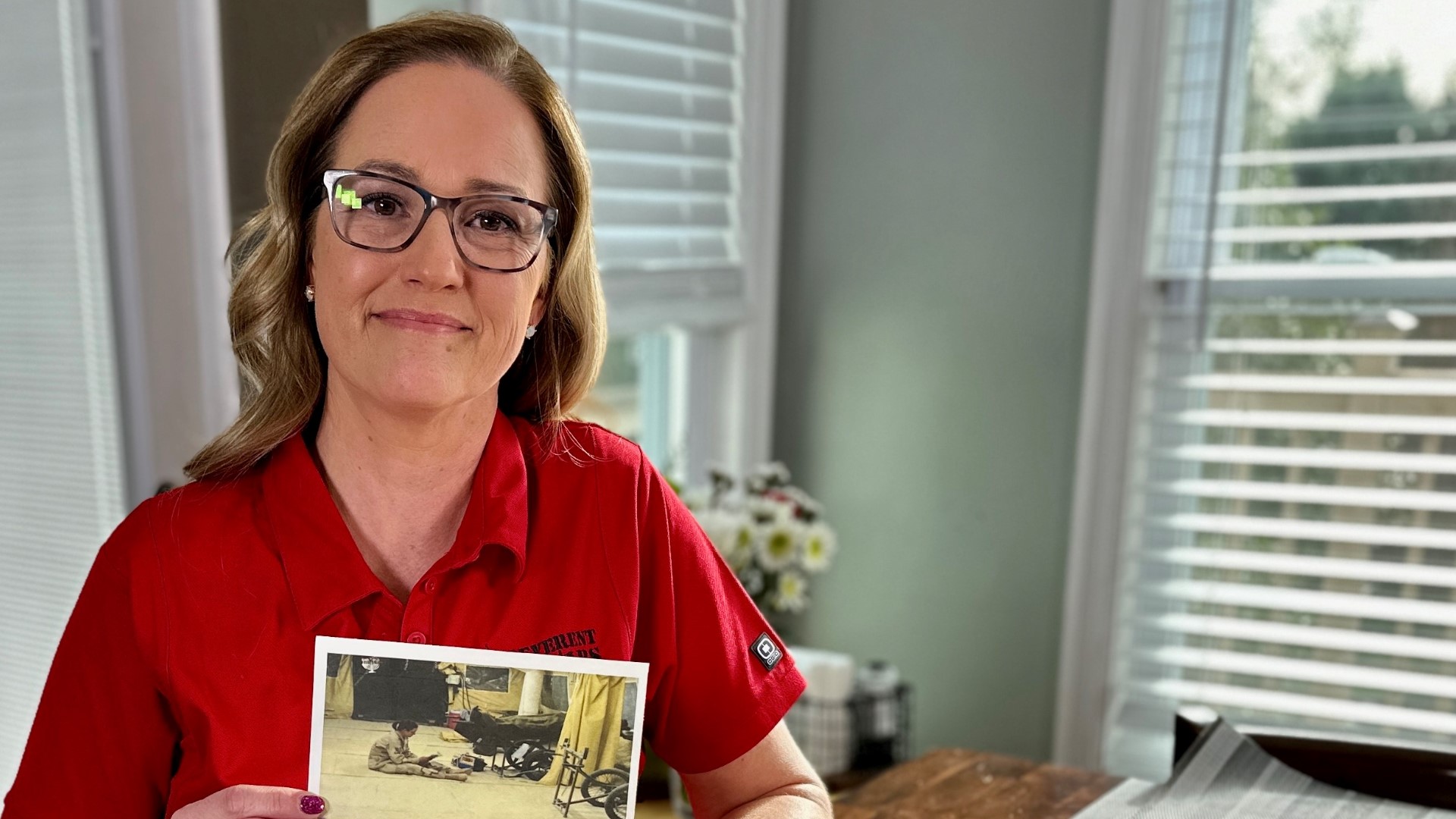KNOXVILLE, Tenn. — A veteran military medic points to a universal question facing almost everyone in uniform at the end of their military service, whether they served four years or 40 years.
“When you leave, the hardest part is figuring out who I am now,” said newly retired Chief Master Sergeant Chrystie Shawhan, whose military career spanned 28 years in the U.S. Air Force.
“I'd be lying if I said that there wasn't a part of me that went, 'Now, what do I do?' And a lot of people go through that,” said Shawhan.
She is a wife, mother, and a relatively new advocate for the national military support group Irreverent Warriors.


“Our mission is to bring veterans together through humor and camaraderie, in order to improve mental health and prevent veteran suicide. Isolation is the killer,” said Shawhan about the national nonprofit started by veterans, for veterans.
The group uses hikes, marches, and other gatherings to draw veterans together.
“We're all in this together, we have to figure out a way that we can figure out what post-(military) life looks like to be a productive member of society to be that positive benefit for somebody else,” said Shawhan.
She is helping organize the upcoming hike in Knoxville set for early May.
All veterans are welcome. She said the group doesn’t discriminate. If you served, you are in. And if you are in, she said to expect to meet people who want to support you in any way they can.
“We just have to remember that everybody has, you know, their road that they have to work through," she said.


10News asked her ten questions about how her military service impacted her life. Her answers are below. The conversation was edited for clarity.
What one person influenced you most in life?
Obviously, you know, my mom was the one who really influenced me from the beginning. First as a mother, and you know, "remember the matriarch," general leadership that she brought into the house, but then she really became the person that I looked to when it came to some of my military stuff. You know, like, 'Hey, you've been there.' Enlisted first officer. Next, 'Hey, mom. Am I being totally ridiculous when I think this way or that way?' And she could bring that perspective in, and it was just awesome to have a mentor. And then sometimes like, 'Hey, I don't need the Colonel, right now I need my mom.' And her being able to understand the difference.
Well, do you feel honored and respected for serving your country?
In East Tennessee, undoubtedly, I will give props. And one of the reasons that my husband and I decided to retire here was because of the veterans' support and the community. And, and I mean you saw the East Tennessee Military Affairs Council. You have at least 58 organizations that come together all at once, and you can't wear any military paraphernalia without being told, 'Thank you for your service.' And I will tell you that when I came home from my rack, that was a fear. When I hit the ground in America, in Chicago, I'll never forget, I had this pit in my stomach, because I was still in uniform, that it was going to be what our Vietnam veterans, excuse me. I'm just like, my mom, by the way. I cry. What our Vietnam veterans felt like, and I was just like, 'I don't know if I can do this.' I was scared to get off the plane. I think because of 9/11, because of what everybody was feeling, this was for the second time when I came home. And so it was just one of those where people were out offering to carry my bags. And they, I mean, so that just relieved everything. And so it was just phenomenal support.
How can people thank you for your service? What means the most to you?
Honestly, it's teaching our kids that the military isn't Plan B. I think a lot of people are like, 'Oh, if I don't go to college, then I'll go to this trade school, or then I'll join the military.' And we need people who want to want to be there. And I think that if I can encourage anybody, they need to understand that it is a trade school, and it's serving your country at the same time, and how they develop that. So it's really understanding that the military is about opportunity. It's not Plan B, it's not the, 'Oh, my kid is struggling and so the military will fix it.' Wanting to want to serve, and how important that is, regardless of who's in office or what's going on in our world that we just need good people to serve.
How do you honor your fellow servicemen and women?
Well, again, being in East Tennessee, we are blessed with multiple different organizations that we can do. And I encourage anybody to find your tribe, you know? Find your people that you want to get with. And, for us, it was a group called Irreverent Warriors. And being involved with them has changed my husband's and I's lives over the past few years. Their whole mission is to bring veterans together through humor and camaraderie in order to prevent veteran suicide. You know, 22 veterans a day take their life. That was a 10-year-old study. So I would even say, since COVID, in isolation, that number is higher. So this gives us an opportunity to continue to serve those around us. Understanding that we've had those struggles ourselves, and just knowing that being together, can break that cycle of isolation.


How do you think this generation of servicemen and women is different from your generation?
So the Air Force I joined doesn't exist anymore. And I've had to have some emotional maturity about that. So when I say, back on Monday, when I'm that guy, I just have to realize that they come with a cell phone in hand with access to all this information, right? Wrong or indifferent, right? Because, you know, not everything on the internet's true, right, wrong or indifferent. They have that readily available. And so they see things differently. And if we don't respect that they come from a different place, we're missing out on a huge talent pool. And, and it's hard to do because I'm this generation and they're Y. So, we emotionally have to show them the why. And then you can build that connection. Not only that, but give them tasks that say, 'I need this to be the end result,' and let them figure out the middle just because they didn't do it the way we were going to do it, because they're not going to do it the way we did it. I came post-Cold War, early Gulf War, you know, Iraqi Freedom, what they're dealing with now, cybersecurity, and I mean, we're hiring hackers to attack into our own stuff, to try to get ahead of the bad guys when I'm calling my admin just to figure out Excel. I mean, again, like they are just doing these things. And it's hard, because the other thing is respecting the peace of recognition. They need the pat on the back. Because they're instant gratification. This 9/11 gave us that 24-hour news. That is that this is the speed that we're working at. And just helping them understand our generation, you're not always gonna get a pat on the back for doing your job. You're gonna get paid, you're gonna get benefits, and you're gonna do all this, but stick with me, and we'll make sure that we can build something successful together,
How has your military experience influenced the rest of your life?
it defines my life. To be honest with you, I mean, growing up military brat, you know, that was always in the background. I joined the military right after high school. And so, you know, they take you in, and they teach you these core values. And the core values were built on the ones that were already instilled because my parents had the same core values, you know? So it was easy to assimilate into that I didn't have to be something I wasn't. And so that is, you know, the movie — Inside Out. You know, those were my core memories. And then it comes from and then the leadership training that they give us at the various building blocks. All of these different people brought me the ability to work with a diverse group of people. I'm not perfect at it, no way, not at all. I stumble and I get in my own way and have my own blind spots. But it just helps you to not be. This is my bubble and I'm gonna work in my bubble and only my bubble, think of my people. You know, this is the keyboard commandos out there. I'm gonna tell you my views and then so I think it helps me to be able to go well, I don't agree with them, but I don't have to.
Your family has a history of military service.
I realized that in my retirement ceremony, I broke a 79-year history. Seventy-nine years. And it was a really tough decision. But there was no way I could wait another eight until my daughter got old enough. There were a lot of fitness tests that were just not going to happen, right? Like, I'm no spring chicken. I was like, 'Well, you know what? We're just going to do it right with the band-aid off.' And so I have grandparents that served in World War II. And then my mom, that's who you know, and then all three of my dads that really helped raise me and define me. We all are from an Air Force background, Army Air Corps, but Air Force background. So that's why I say when we have those core values, we really do. And so just watching them, and what I remember was, they always enjoyed going to work. Nobody's job is perfect every single day, you know, but they loved it. But they loved going to work and they love serving. And that was just something that I took with me.
And would you encourage your children to go into military service?
Yes. And my husband and I joke about this, that we would be very particular on which branch of service, which one — the Air Force, My husband's a Marine. But he, when it comes down to the quality of life, and where they spend their money, you can joke that we're a country club and that we have all the best golf courses and everything like that. But we also have all the shiny new stuff, we have the Joint Strike Fighter, we're in the cybersecurity world, and we're at the tip of the spear when it comes to that. We do not have a whole lot of equipment that you know, except that we've recorded it and kept it where we're using duct tape. And so when it comes to how they treat their people and invest in the future, one thing that Air Force does great is being able to say, 'Okay, you serve four years. Awesome, you serve 20 years. Fantastic.' What are you going to do when you leave us because they see the airmen not only as an asset to them while they're in. But that's your recruiting recruiters outside. So when you leave, I need to know that your experience was great. So you want your kids to come into that branch of service. So yeah, definitely the Air Force.
You served at war. How has serving at war changed your views about war? Or has it?
Yeah, so I deployed the first time I deployed was more of a peacetime situation and during Southern Watch, and so we were in Saudi Arabia, we had barbecues, we had three swimming pools, we had, you know, all this stuff. You know, I was 23 years old and what do I know? I wanted to serve just, you know? 9/11 hurt me just as much as everybody else. So I remember vividly, I got there and your time clock's all off. And so you put in your Kevlar helmet on and I'm like, I'm gonna go walk over the hospital. Hadn't been over there yet. I'm gonna go check this out, see what's going on. I was a medic by training. And so there I am in my footie pajamas, and my combat boots in like Kevlar and my Battle Rattle. And I go when I walk into this hospital where the ICU was, and I was like, 'Oh, my God, where did these people come from? Like, they're really messed up.' They came from there, you know, 200 yards away. I mean, it was just one of those like, okay, and then we got our first mortar attack. And the person I was replacing saw the look on my face, and she's like, we're gonna get on the ground now. And I'm like, okay, yeah. Like, this is exactly like we lowered the patient that was there because we had sandbags. So you wanted to be below the sandbags. And I got under a desk and I was like, 'I want my mommy. What am I doing here?'
How did your war service impact your faith?
Part of my recovery, my treatment, was ensuring that I got back with Jesus. You know, got that back into my life and my husband believes the same beliefs, and so the recovery put the faith back in me that bad things happen, so that we turn to God so that we have that faith. If everything is peachy keen groovy, nifty, awesome. Where does empathy come from? Where does compassion come from? We don't need it right? We don't need compassion. If it's not, you know, and there are different people out there with different motives and so that it helped me to see that, you know, there is bad in the world and it's easy to get scared by it but the only way to get through it is to ensure that your faith is with you.

